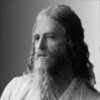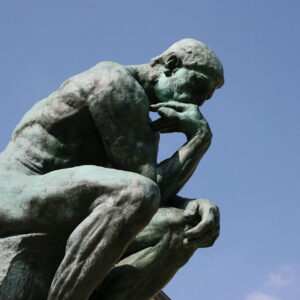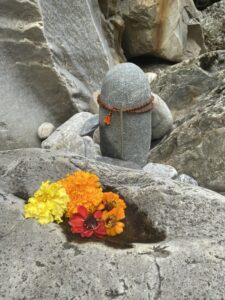Did you ever go to a party and meet someone, then a moment later forget their name? Well, that’s like my whole life. I have been accused of having a poor memory, and I think there may be some validity to this. The thing is: it’s not as if my powers of recollection are weaker than others, it’s more like I don’t exercise the memory function as much as most.
In Patanjali’s Yoga Sutras, one of the primary yogic texts, the author defines memory as “not releasing mental agitations of the past.” This is noteworthy in two regards. First, “not releasing” is active. Remembering is a kinetic engagement; it requires a certain amount of effort. In the present, this is energy expended which could potentially be exercised in more productive ways. Also, similar to the way our computers work, retaining too much can fill our storage space with old files and junk, making our body and mind more laggy. With too many accumulated memories, especially unpleasant ones, we are not operating at our highest capacity.
Second, memory is an agitation in the mind. This isn’t necessarily a bad thing, we do want the capacity to recall. Otherwise, we would never remember where we left our keys, or the remote, and no one should forget their spouse’s birthday! But when memory becomes a burden, rather than a choice, we have lost our freedom and empowerment.
Disturbing agitations, such as upsetting memories, do not aid in living a fulfilling life. Digging up the past often sabotages our ability to enjoy our current situations. People and events become symbols of the past, and we project meanings on the present that may not necessarily be there. The stories we tell ourselves, our internal dialogue about history, can interfere with perceiving who we are now, and prevent the opportunity to heal and live in a refreshing manner.
Memories which reinforce a story of loss, in particular, are not very valuable. You are already a winner. Everyone of us is inherently a gold medalist; we are the ones who won the sperm race! You came in first.
There’s a good chance you don’t remember your conception, your gate into this world. This shouldn’t be surprising because we don’t remember many, many things. We don’t recall most of our childhood, we forget our dreams most every morning, and hardly anyone remembers who, and where, they were before they were born. Memory is not the accurate dynamic which can factually present the information we need to live well. It is more like the Wizard of Oz, claiming to be all- knowing and all-powerful. Yogis are sorta’ like Toto, pulling back the curtain to reveal memory isn’t all its cracked up to be. Your power isn’t behind the curtain of the past, it’s in you, here and now.
If someone put a gun to your head and insisted you watch reruns of scary and upsetting movies, ok. Then you’d have a good reason to feel punished. But, we are often our own worst enemies: we force ourselves to watch the same ol’, same ol’ depictions of what occurred in our lives which we deem painful.
Yoga is nothing if not eminently practical. It offers a path out of this morass. The approach of yoga is different, however, to much of what passes for personal growth.
In yoga, it is recognized that individual identity revolves around the deepest core emotion. For many, this is some drama. Our personhood then grows from a seed of pain. If such a seed germinates, we may well expect the plant of life to grow in suffering.
What we seek to accomplish in yoga is to weed out the seeds of suffering replacing them with seeds of gratitude, healing, and love. This is not something that can be faked, it requires the experience of a joy deeper than any trauma. Yoga provides the tools to discover this joy but, unfortunately, many choose not to accept the gift.
Imagine a spinning fan, representing your negative memories. Our knee jerk reaction is often to call the fan a bad name and recoil, wishing it weren’t spinning. We may even exercise discipline and will power, sticking our arm into the fan to get it to stop. Neither of these strategies is ultimately effective. Hoping the fan will stop spinning on its own won’t work. Will-power is not strong enough to overcome deep rooted fears. Eventually your arm becomes tired, it drops, and the fan resumes, resulting in not only the continuation of the problems, but a sense of failure.
Yoga suggests a different approach, looking at the fan without guilt, shame, or fear. You will then notice something remarkable: the fan has a cord which is plugged into an outlet. The outlet is the cause, the spinning is the effect. You’ll discover your have the innate power to disconnect the cord. When you do unplug, the fan stops spinning on its own.
It’s really rather simple, but no one who has undertaken this process will claim it is easy. The spinning fan has become familiar, comforting in an odd way, providing a sense of security. The process is one of unplugging the fan, enjoying a period of respite, and then plugging the darn thing back in. This is nothing to be disturbed about, healing is a path, and it’s something that everyone goes through. The cool thing is that even brief periods of calm and joy become a touchstone, and so much more enjoyable, that one will eventually become accustomed to being happy and the need to keep the fan spinning falls away naturally.
The great tool for becoming free from the prison of oppressive memories is forgiveness. Forgiveness of others for what they may have done to hurt us, and forgiveness of ourselves for that which we have done. Our grandmas were right; forgive and forget. When we forgive, the expansive past shrinks into a little bubble, which pops and is forever no more. There may remain a small reminder of the past, which serves as a lessoned learned so the future can be brighter, but memory stops being a master and takes its place as a servant.
Everyone will have a unique experience of forgiveness. Everyone will, though, have a universal experience that forgiveness occurs with responsibility. How did I get into such a mess? What energy stream did I follow? If we own our lives, we are empowered. We can’t change the past, but we can learn how we took part in manifesting suffering. Then, with such insight, we can choose differently, we can follow brighter energy streams and inch our way through dead dreams to another land.
To be clear, I understand truly horrible things happen which can be difficult to forgive. I know I have done unkind things to others during my life, and I have experienced cruelty at the hands of others. However, our choice is to forgive or to suffer. We can only have one. We can be happy or we can be right. You can argue against this, and you could presumably win the fight with yourself, but if you choose not to forgive you will remain unhappy. Do you really want to win an argument which keeps you in suffering? You get to decide for yourself. Try to use your memory well: remember you are empowered to forgive and be forgiven




